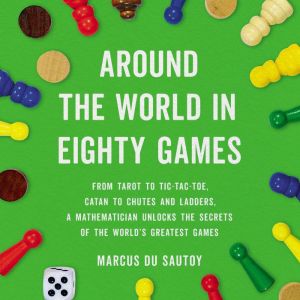

List: $31.99
| Sale: $22.40
Club: $15.99
Around the World in Eighty Games
From Tarot to Tic-Tac-Toe, Catan to Chutes and Ladders, a Mathematician Unlocks the Secrets of the World's Greatest Games
Author: Marcus du Sautoy
Narrator: Mark Elstob
Unabridged: 12 hr 36 min
Format: Digital Audiobook Download
Publisher: Basic Books
Published: 11/07/2023
Categories: Nonfiction, Mathematics, Games & Activities
Includes:
Bonus Material
![]()
Synopsis
“A delightful global tour of how humans think and play, led by one of our finest mathematical storytellers.” — Ben Orlin, author of Math Games with Bad Drawings
Where should you move first in Connect 4? What is the best property in Monopoly? And how can pi help you win rock paper scissors?
Spanning millennia, oceans and continents, countries and cultures, Around the World in Eighty Games gleefully explores how mathematics and games have always been deeply intertwined. Renowned mathematician Marcus du Sautoy investigates how games provided the first opportunities for deep mathematical insight into the world, how understanding math can help us play games better, and how both math and games are integral to human psychology and culture.
For as long as there have been people, there have been games, and for nearly as long, we have been exploring and discovering mathematics. A grand adventure, Around the World in Eighty Games teaches us not just how games are won, but how they, and their math, shape who we are.
Where should you move first in Connect 4? What is the best property in Monopoly? And how can pi help you win rock paper scissors?
Spanning millennia, oceans and continents, countries and cultures, Around the World in Eighty Games gleefully explores how mathematics and games have always been deeply intertwined. Renowned mathematician Marcus du Sautoy investigates how games provided the first opportunities for deep mathematical insight into the world, how understanding math can help us play games better, and how both math and games are integral to human psychology and culture.
For as long as there have been people, there have been games, and for nearly as long, we have been exploring and discovering mathematics. A grand adventure, Around the World in Eighty Games teaches us not just how games are won, but how they, and their math, shape who we are.